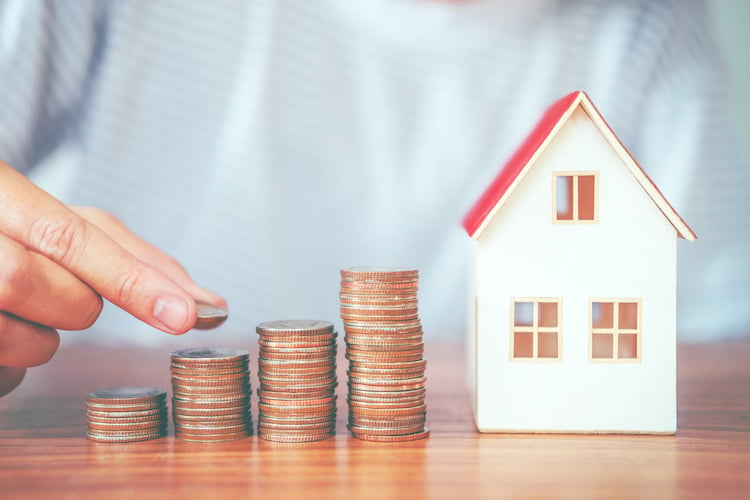No matter where you look today, you’ll find the demand for single-family rental property is surging. Tenants like renting a larger home versus a cramped apartment, and investors like single-family rentals for the potential profits and returns.
At first glance, it might seem like owning a rental property is an ideal investment. But that isn’t necessarily true for everyone.
Let’s like a look at how landlords make money and pros and cons to consider to help you decide if rental properties are worth it.
Key takeaways
- Landlords make money from recurring cash flow from rental income, appreciation in property value over the long term, and tax benefits that real estate investors enjoy.
- Depreciation is one tax benefit landlords use to reduce or even eliminate taxable net income from a rental property.
- Potential advantages of owning a rental property include positive cash flow, profit from property appreciation, and keeping a home as a rental property or turning it into a primary residence.
- Before buying a rental property, an investor should consider how to raise a down payment and whether to self-manage a property or delegate to a professional property manager.
How you make money with real estate investments
In order to decide whether owning a rental property is worth the time and effort, it’s important to understand how real estate investments work to make money.
Think of a rental property as a square table, with each of the four corners representing a source of potential income: Cash flow, mortgage principal balance reduction, property appreciation, and tax benefits.
Recurring cash flow from rental income
The first way that landlords aim to make money from rental properties is by collecting rent from a tenant, then using the tenant’s money to pay operating expenses and the mortgage. Any money left over at the end of each period is known as positive cash flow.
To illustrate how cash flow is generated, let’s assume an investor buys a single-family rental home listed for sale on Roofstock for $150,000 with a tenant already in place. Gross rental income is $1,500 per month. The property was purchased with a 25% down payment and an investor loan was used to finance the balance, with a monthly mortgage payment of $537 (principal and interest).
Here’s what the annual cash flow statement for the rental property might look like:
Income
- Rent: $18,000
- Vacancy Factor: -$900
Expected Rent: $17,100
Expenses
- Property Management: -$1,440
- Repairs and Maintenance: -$650
- Insurance: -$950
- Property Taxes: -$1,200
- HOA Fees: -$600
Total Operating Expenses: -$4,840
Net Operating Income: $12,260
- Capital Reserve Contributions: -$700
Unlevered Cash Flow: $11,560
- Mortgage Payment: $6,444
Total Net Cash Flow: $5,116
In this example, an investor could earn a positive cash flow of $5,116 per year purchasing a rental property with a down payment of $37,500 (excluding closing costs), then using rental income from a tenant to pay all of the operating expenses and the mortgage payment.
It’s worth pointing out that negative cash flow can also occur if a property does not generate enough rental income to pay the bills. This can occur when a property is vacant and it takes longer than expected to find a qualified tenant, or in months where maintenance expenses are higher than expected.
Mortgage reduction using tenant’s money
Another way a real estate investor may make money from rental property is by using part of the monthly rent to pay down the mortgage principal balance. The lower the mortgage balance becomes, the more equity there may be in a home, assuming that property prices remain unchanged.
Here’s how the mortgage principal balance might change if an investor buys a rental property and holds it for 5 years using a fixed-rate mortgage:
| Year 1 | Year 2 | Year 3 | Year 4 | Year 5 | |
| Total mortgage payment | $6,444 | $6,444 | $6,444 | $6,444 | $6,444 |
| Principal payment | $1,980 | $2,061 | $2,144 | $2,232 | $2,323 |
| Interest payment | $4,464 | $4,383 | $4,300 | $4,212 | $4,121 |
| Principal balance | $110,520 | $108,459 | $106,315 | $104,083 | $101,760 |
Note that each year the interest part of the mortgage payment decreases as the principal balance is paid down.
In this example, an investor has used a tenant’s rent money to reduce the principal balance from $112,500 when the home was first purchased to $101,760 at the end of 5 years. Assuming the property value remains unchanged, the equity in the home has increased from $37,500 (the down payment amount) to $48,240, which is a gain of $10,740 over 5 years.
Appreciation in property value
The third way a rental home may make money for a real estate investor is by appreciating in value over the long term. Last year, the value of a typical middle price tier home in the U.S. increased by 19.2% and is forecast to grow by another 13.6% over the next year, according to Zillow (through October 31, 2021).
Assuming homes values increase by an average of 10% per year, at the end of 5 years the home in this example should be worth $219,615 and the total equity in the home – including appreciation in property value and reduction in the mortgage balance – should be $117,855:
| Year 1 | Year 2 | Year 3 | Year 4 | Year 5 | |
| Home Value | $150,000 | $165,000 | $181,500 | $199,650 | $219,615 |
| Principal balance | $110,520 | $108,459 | $106,315 | $104,083 | $101,760 |
| Total equity | $39,480 | $56,541 | $75,185 | $95,567 | $117,855 |
Based on this example, if an investor sold the rental property at the end of 5 years, the total gross gain would be $143,435 (total equity of $117,855 plus positive cash flow of $5,116 per year over 5 years), excluding closing costs such as a real estate commission and escrow fees.
This example assumes that home prices consistently increase year over year. However, while the single-family housing market has performed extremely well over the past several years, it’s important to remember that home prices can go down as well as up.
As this chart from the Federal Reserve illustrates, during the Global Financial Crisis of 2007-2009 the median sales price of houses sold declined by about 20% (Q1 2007-Q1 2009), and by roughly 8% between Q4 2017 and Q1 2019. Investors who sold during these downturns may have lost a large portion, if not all, of their equity and potential profits.
Tax benefits real estate investors receive
Last, but certainly not least, there are a variety of tax benefits that come with owning a rental property.
Operating expenses, mortgage interest, and property taxes are deducted from pre-tax income. An investor may also be able to deduct business expenses such as traveling to and from a rental property, and continuing education expenses to become a better real estate investor, like the Roofstock Academy.
Another tax benefit of owning a rental property is the annual depreciation expense used to reduce taxable net income. The IRS allows residential rental property to be depreciated over a period of 27.5 years, excluding the value of the lot or land. If a rental property was purchased for $150,000 and the lot value is $30,000, the depreciation expense would be $4,364 per year ($150,000 purchase price - $30,000 lot value = $120,000 cost basis / 27.5 years).
Assuming the same property generates a net operating income (NOI) of $12,260 per year, an investor could reduce the taxable net income to $7,896 by deducting the depreciation expense from the NOI.
Unlike a homeowner who owns a primary residence, rental property does not have a capital gains tax exclusion when the home is sold. However, when and if the time comes to sell a rental property, an investor may use a 1031 exchange to defer paying capital gains tax by purchasing another investment property within 180 days of the sale of the first property.
Pros and cons of owning rental property
To recap, let’s look at some of the potential pros and cons of owning a rental property to help decide if rental properties are worth it.
Pros
- Rental income collected from a tenant is used to pay operating expenses and the mortgage.
- Potential for positive cash flow at the end of a period after all of the bills have been paid.
- Property may appreciate in value over the long term, building equity for a real estate investor.
- Cash out refinancing or a home equity line of credit (HELOC) may be used to turn accrued equity into cash for the down payment of another rental property.
- Flexibility of keeping the rental property to generate cash flow, selling it when the time is right, or moving into the home as a principal residence.
- Tax benefits include deducting operating expenses, mortgage interest, property taxes, and depreciation to reduce taxable income.
Cons
- May take some time to find a good rental property when there is so much demand from other investors.
- Risk of having a tenant not pay the rent or damage the property, even when a tenant is thoroughly screened.
- Rental property needs to be regularly maintained to be habitable for a tenant and hold value.
- Self-managing a rental property can be time consuming, complex, and difficult for both local and remote real estate investors.
- Down payment of around 25% is often required to finance an investment property.
- Real estate is illiquid and may take weeks or months to buy and sell even in a seller’s market.
Final thoughts
There are a number of potential benefits to rental properties, including using rental income from a tenant to pay operating expenses and the mortgage, potentially earning additional profits through appreciation, and using tax benefits like depreciation to reduce or even eliminate taxable income.
There’s also a lot of work that comes with rental property. But by hiring a professional property manager, an investor can delegate the day to day operations to a manager while focusing on ways to increase income and gradually grow a rental property portfolio.










